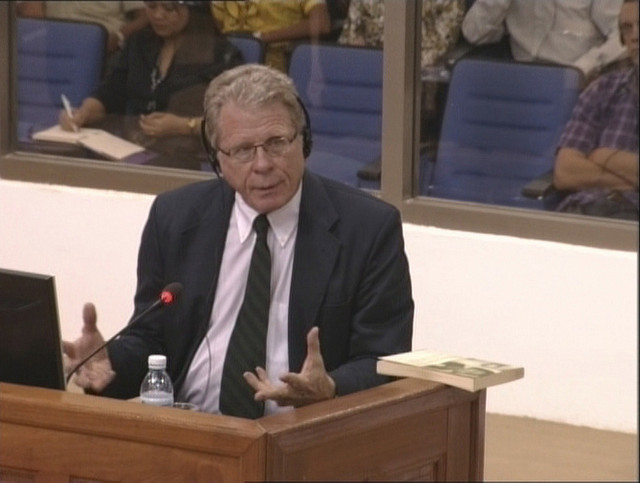January 29, 2015
New Book Review: The Articulate Witness
One of the duties of a litigator is to prepare the client to testify at a deposition, mediation, hearing or trial. Clear, credible and cogent testimony puts the party in the best position to prevail. While judges, arbitrators and juries want to see the contracts and key documents, they also want to hear directly from the parties whose dispute is before the court.
Experienced trial attorneys know what to expect of themselves and their witnesses from the facts of the case. When it comes to public speaking, witness preparation typically includes discussion of the disputed facts and legal arguments in the case. While an attorney may not tell the client or witness what to say, he may ask practice examination questions. Witnesses quickly learn that courtroom or deposition testimony differs from ordinary conversation or interviews. A witness may have little or no public speaking training or experience. There may not be time for a witness to gain valuable experience in Toastmasters International or other activities to practice speaking skills. So how can a witness prepare herself to give effective testimony in her own case?
This month, Brian K. Johnson and Marsha Hunter published a new book, “The Articulate Witness: An Illustrated Guide to Testifying Confidently Under Oath.” This edition is available in print or e-book format. Johnson & Hunter are consultants who train attorneys for a variety of public speaking settings. I have read one of their other books and attended one of their seminars. “The Articulate Witness” is useful to parties and witnesses seeking an overview of the legal testimonial process. It is a valuable resource for attorneys and law students seeking insights in how to better prepare their clients to testify. Professional experts evaluating their own habits and skills would benefit as well. The book is a breezy 50 pages with copious illustrations. I finished it riding on the D.C. Metro between the Judiciary Square & West Falls Church stations. The book focuses on the mechanics of speaking confidently in litigation situations, including cross-examination. The book would be useful to a witness when they first know that a deposition, hearing, trial, etc. will occur. It is not a good book to read the evening before the big day. The reader may desire to practice some of the exercises or discuss them with the attorney beforehand. The book is not a proper substitute for trial preparation with one’s attorney.
A common mistaken belief is that public speaking involves only expressing one’s thoughts using one’s voice. Johnson & Hunter do a great job of showing how it is also a “physical” activity, involving posture, gestures, handling exhibit documents, facial expression and eye contact.
“The Articulate Witness” is an excellent reference for witnesses,attorneys, experts or any other person whose profession or circumstances require him to speak in a legal proceeding. Mastery of the facts and laws is not sufficient. One must be prepared to cogently communicate one’s position to others.
photo credit: Extraordinary Chambers in the Courts of Cambodia via photopin cc
December 9, 2014
Resolutions for Homeowners Dealing with Construction Defects
A good home provides a safe, comfortable and enjoyable place to live. When a contractor makes mistakes in construction, renovation or repair, the owner or tenant has to live with those defects every day until the problem is resolved. The coming New Year is a good time for homeowners to prioritize addressing contractor defects. In 2015, devise a strategy for relief from construction defects and feel love for your home again.
The key to efficiently realizing a goal is outlining the steps needed to realize it. This gives the owner a “to-do” list that can be tackled step-by-step over time. This may include a warranty claim against the contractor. Many contractors stand by their work and will honor well-founded warranty claims. It’s difficult to build a business from a base of disgruntled former customers. With some contractors, legal assistance may be necessary to obtain relief under a warranty. No two construction defect cases are the same. In each case, the contracts, warranties, physical conditions and defects are different. However, there are strategies that can make the process easier for the homeowner. The following are 7 New Year’s resolutions for homeowners dealing with construction defects:
- Investigate Defects Fully: Examine and photograph the physical appearance of the defects. Obtain copies of the manufacturer’s installation instructions. Research online reviews or other information about the materials used. Wise homeowners focus first on any safety or health concerns. In some cases, taking temporary action to limit future damage may be necessary. Discovering the truth about the defect is a solid foundation for dealing with it.
- Organize Warranty Information. The contractor likely provided contracts, correspondence, warranties and invoices. Usually installers do not warranty the materials used. The warranties for materials may have been provided in the packaging or available from the manufacturer. These items must be reviewed together and can become easily misplaced if not organized.
- Consult Regarding Implied Warranties. Many homeowners are not aware that a written set of terms is not the only way that products and installation may be covered by a warranty. In Virginia, there are certain contractor warranties that arise under operation of law. Consult with a qualified attorney about how coverage may arise under implied or written warranties. Unfortunately, warranties are easily waived if claims are not timely pursued.
- Consult Regarding Obtaining Expert Reports About Defects. In order to fix the defect, ultimately a qualified person will need to do further work on the house. To prove a warranty claim in court, the owner may need an expert witness to testify regarding the breach of duties or the proper figure of damages. Depending on the needs of the case, that expert may be a home inspector, licensed contractor, engineer, tradesperson or professional estimator. Hiring an expert to provide assistance in a lawsuit, reports or court testimony is not like hiring a professional to work on the house. If an expert is being engaged to provide legal support or trial testimony, the owner’s lawyer is the proper representative to work directly with the expert. One of the most important characteristics in retaining an expert in these types of cases is independence. A homeowner is not well served by an inspector or other contractor who will not be able to testify against the interests of the contractor who committed the defects. It’s best to go completely outside of the referral network of the builder.
- Consider Goals for the Property. When a dispute with a contractor erupts, sometimes even smart homeowners may struggle to maintain focus on how the project fits in to their goals for maintaining and developing the property. The homeowner may need to adjust their goals to fit new circumstances.
- Preserve Copies of Contractor’s Representations: If the contractor used intentional concealment, fraud or misrepresentation in the course of selling his services, the owner may have a claim for enhanced damages. Fraud cases are very difficult to prove, and the facts of most cases don’t support them. However, sometimes misrepresentations can be found in e-mail, text message or social media communications. Savvy owners take care to preserve any electronic communications with the contractor’s representatives.
- Consult with Counsel About Pursuing Claims. Once the case has been properly investigated with the assistance of legal counsel, the homeowner is in the best position to go back to the contractor about the warranty claim and, if necessary, pursue a legal remedy.
Whether a homeowner’s best interests lie in simply fixing the problem on their own or pursuing a legal claim against the contractor depends upon the unique circumstances of the case. Homeowners have the benefit of control over the property where key evidence may be preserved. The New Year is a good time for families to take necessary action to protect their physical, financial and legal aspects of home ownership.
photo credit: ungard via photopin cc (I am not aware of any defects with the house depicted in this photo, which was chosen for its seasonal characteristics)


